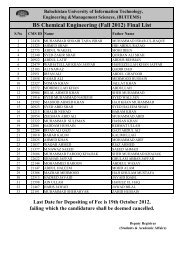BUITEMS
Research Journal - buitems
Research Journal - buitems
- No tags were found...
Create successful ePaper yourself
Turn your PDF publications into a flip-book with our unique Google optimized e-Paper software.
<strong>BUITEMS</strong><br />
Quality & Excellence in Education<br />
The Schema as the Predictor of Depression among the Adolescents<br />
DISCUSSION<br />
The aim of this paper was to investigate the<br />
role of individual’s schema in generating the<br />
depression among the adolescents. The<br />
results indicate that emotional deprivation,<br />
dependence/ incompetence, subjugation and<br />
self sacrifice are the strongest predictors of<br />
depression among the adolescents. The<br />
results also demonstrate the negative<br />
correlation between the depression and<br />
readiness to change, though not quite<br />
significantly. However, these results must be<br />
interpreted cautiously as the sample was<br />
small and the schemas are pre-conceived<br />
ideas that vary from time to time and from<br />
individual to individual following different as<br />
well as adverse circumstances. The study<br />
shows that even very modest shifts in mood<br />
can influence the way in which participants<br />
respond to some questions on the YSQ.<br />
Changes in mood may alter a person’s view<br />
of self in a negative direction (Stopa and<br />
Waters, 2005). As adolescents is a transitory<br />
phase, which Erickson (Rahman and Ahmed,<br />
2006) called identity versus role diffusion; as<br />
going through transitions these young minds<br />
may avoid problems rather than solving them.<br />
It highly advocates our results of reluctance<br />
to change their current schemas as they<br />
consider themselves well inclined to their life<br />
issues and changes. Young (1999) proposed<br />
that schemas can be grouped into domains,<br />
which represent the hypothesized<br />
developmental origins of the schemas. He<br />
described five domains: disconnection and<br />
rejection, impaired autonomy and<br />
performance, impaired limits, otherdirectedness,<br />
and over-vigilance and<br />
inhibition. Each domain represents a<br />
grouping of developmental needs. There is<br />
no evidence at this stage to indicate whether<br />
the developmental stage at which the<br />
schema emerged influences when and how<br />
that schema is retrieved. However, it is<br />
interesting to note that both of the schemas<br />
which were raised in the depressed mood<br />
condition belong to the earliest domain, that<br />
is, disconnection and rejection. On the other<br />
hand, entitlement which is raised in the happy<br />
condition belongs to the later developmental<br />
domain of impaired limits (Stopa and Waters,<br />
2005).<br />
In the whole study we found the low score on<br />
the Entitlement; we have found that this<br />
schema can be problematic for clinical<br />
patients, both when it is high and also when<br />
it is low. For example, people with very low<br />
entitlement scores may be unable to<br />
appropriately assert themselves, may feel<br />
that their needs are unimportant, and may<br />
tolerate unacceptable behavior from others.<br />
It is possible that moderate levels of<br />
entitlement are both healthy and have a<br />
protective function for the individual. Again,<br />
these points must be interpreted with caution,<br />
as we do not have data on the ‘healthy’ range<br />
of entitlement scores (Stopa and Waters,<br />
2005). A basic premise of Jeffrey Young’s<br />
approach is that individuals with more<br />
complex problems have one or more early<br />
maladaptive schemas, which makes them<br />
vulnerable to emotional disorders.<br />
Most of our hypotheses have been approved<br />
as per our results indicated. The question of<br />
which cognitive schemas as measured by<br />
Young’s Schema Questionnaire (Young,<br />
1994) were related to depression has been<br />
examined in several studies. Schmidt et al.<br />
(1995) reported that ‘dependency’ and<br />
‘defectiveness’ predicted depression in an<br />
undergraduate student sample.<br />
‘Mistrust/abuse’, ‘abandonment’, and ‘social<br />
isolation’ predicted depression in college<br />
students in Harris, Curtin, and Vicente’s study<br />
(1999). (‘Defectiveness/shame’, ‘selfsacrifice’,<br />
and ‘insufficient self-control’ in a<br />
clinical sample and ‘vulnerability to harm’ in<br />
a nonclinical sample predicted depression in<br />
Shah and Waller’s study, 2000). Taken<br />
together, while inconsistent across studies,<br />
the seven cognitive schemas directly related<br />
to depression in previous research afforded<br />
the highest likelihood of establishing<br />
connections to depression (Cankaya, 2002).<br />
The present design and time duration did not<br />
allow us to examine why some schemas<br />
should be affected whereas others were not.<br />
One of the main weakness was that<br />
individuals were currently in varied<br />
circumstances and those affected<br />
significantly in their responses to the<br />
questionnaires. As the Young Schema<br />
Questionnaire was adapted, for this study<br />
mainly due to the reason as it measures<br />
5
















